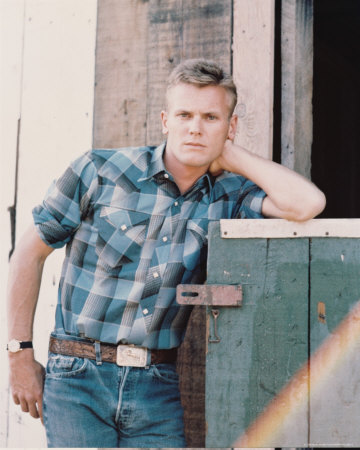 I was surprised at how much I learned about how Hollywood works from this biography of a star of the 1950’s. Tab Hunter was a “heart-throb”, an actor who was marketed for his handsomeness. I frankly don’t find his kind of looks very attractive, but many people do. His autobiography is “co-authored”, probably meaning that Hunter was extensively interviewed, provided tape recorded reminiscences, and the “co-author” put it together in first-person voice. It’s a perfectly valid way for an actor, who doesn’t happen to be an experienced writer, to tell his story. In this case, the result seems to be unusually honest. Hunter stumbled into movie acting, and was initially successful because of his looks. He was gay, and went through the complexities, strategies, and perils that gay actors had to face in the 1950s. What it particularly charming about the narrative is the fact that Hunter (real name Arthur Andrew Kelm), who had an impoverished childhood in a rather disfunctional single-parent family, was in person a rather bashful, reticent, and psychologically conservative person, more comfortable with horses than people. His wholesome, boy-next-door image was not an act. However, he was able to attract people like Anthony Perkins and Rudolf Nureyev as lovers. He moved easily in sophisticated circles in the theatre, and in Europe’s high society, without altering his persona. His acting career has never been taken seriously, though he did some fine work on the stage and in television, and clearly cared deeply about his craft. He struggled to get roles that didn’t consist mostly of posing shirtless. But in the end, he was done in by cultural shifts that put his image out of fashion. His most intelligent career move was to appear in John Waters’ 1980 low budget cult film, Polyester. That, and publicly coming out of the closet, won him the respect he had never gotten as a teen idol. The book is not vindictive, but it gives a very believable account of some of the nastier things that went on in the film industry in the 1950’s and 1960’s.
I was surprised at how much I learned about how Hollywood works from this biography of a star of the 1950’s. Tab Hunter was a “heart-throb”, an actor who was marketed for his handsomeness. I frankly don’t find his kind of looks very attractive, but many people do. His autobiography is “co-authored”, probably meaning that Hunter was extensively interviewed, provided tape recorded reminiscences, and the “co-author” put it together in first-person voice. It’s a perfectly valid way for an actor, who doesn’t happen to be an experienced writer, to tell his story. In this case, the result seems to be unusually honest. Hunter stumbled into movie acting, and was initially successful because of his looks. He was gay, and went through the complexities, strategies, and perils that gay actors had to face in the 1950s. What it particularly charming about the narrative is the fact that Hunter (real name Arthur Andrew Kelm), who had an impoverished childhood in a rather disfunctional single-parent family, was in person a rather bashful, reticent, and psychologically conservative person, more comfortable with horses than people. His wholesome, boy-next-door image was not an act. However, he was able to attract people like Anthony Perkins and Rudolf Nureyev as lovers. He moved easily in sophisticated circles in the theatre, and in Europe’s high society, without altering his persona. His acting career has never been taken seriously, though he did some fine work on the stage and in television, and clearly cared deeply about his craft. He struggled to get roles that didn’t consist mostly of posing shirtless. But in the end, he was done in by cultural shifts that put his image out of fashion. His most intelligent career move was to appear in John Waters’ 1980 low budget cult film, Polyester. That, and publicly coming out of the closet, won him the respect he had never gotten as a teen idol. The book is not vindictive, but it gives a very believable account of some of the nastier things that went on in the film industry in the 1950’s and 1960’s.
14667. (Tab Hunter & Eddie Muller) Tab Hunter Confidential
Leave a Comment
You must be logged in to post a comment.
0 Comments.